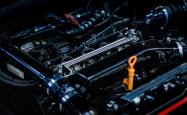The Ultimate Guide to Car Maintenance:English Edition for Car Enthusiasts
Introduction
In the world of automobiles, proper maintenance is key to ensuring the longevity, performance, and safety of your vehicle. Whether you're a seasoned car owner or a first-time driver, understanding the basics of car maintenance is crucial. In this comprehensive guide, we will delve into the essential aspects of car care, providing you with the knowledge and tips you need to keep your vehicle in top condition. This English edition is tailored for car enthusiasts who want to speak the language of their beloved machines.
Understanding the Importance of Regular Maintenance
Regular car maintenance is not just about keeping your vehicle looking shiny and new; it's about ensuring that all systems are functioning optimally. A well-maintained car is not only safer to drive but also more fuel-efficient and less likely to break down unexpectedly. Here are some of the key benefits of regular car maintenance:
1、Safety: Regular checks and tune-ups can help identify potential safety hazards before they become serious issues.
2、Performance: A well-maintained engine will perform better, providing smoother acceleration and improved fuel economy.
3、Resale Value: A vehicle that has been properly maintained will hold its value better than one that has been neglected.
4、Cost Savings: Preventative maintenance can help you avoid costly repairs down the line by catching small issues before they become major problems.
The Essential Maintenance Schedule
While the specific maintenance schedule for your car may vary depending on the make and model, there are some general guidelines that apply to most vehicles. Here's a breakdown of the essential maintenance tasks and their recommended intervals:
1、Oil Change: Every 3,000 to 5,000 miles or as specified by the manufacturer.
2、Tire Rotation: Every 5,000 to 7,500 miles to ensure even wear.
3、Brake Inspection: Every 6 months or 10,000 miles to check for wear and proper function.
4、Fluid Checks: Every 12 months or 12,000 miles, including transmission, coolant, and power steering fluids.

5、Air Filter Replacement: Every 12,000 to 15,000 miles to maintain engine efficiency.
6、Spark Plugs: Depending on the type, replace every 30,000 to 100,000 miles.
7、Belts and Hoses: Inspect every 24,000 miles and replace as needed.
8、Battery: Check every 24 months and replace every 3 to 5 years.
9、Suspension and Alignment: Check every 15,000 miles to ensure proper handling and tire wear.
Advanced Maintenance for Enthusiasts
For those who are more hands-on and interested in the intricacies of their vehicles, here are some advanced maintenance tasks that can help you get the most out of your car:
1、Timing Belt Replacement: Typically required every 60,000 to 100,000 miles, depending on the vehicle.
2、Fuel System Cleaning: Every 15,000 to 30,000 miles to remove deposits and improve performance.
3、Cooling System Flush: Every 24 months or 24,000 miles to prevent overheating and corrosion.
4、Transmission Fluid Change: Every 30,000 to 60,000 miles, depending on the type of transmission.
5、Differential Fluid Change: Every 30,000 to 50,000 miles for optimal performance and longevity.
6、Engine Performance Tune-Up: As needed, based on symptoms such as poor fuel economy or rough idling.
7、Exhaust System Inspection: Regularly check for leaks and corrosion to maintain emissions standards and performance.
DIY Maintenance Tips
For those who prefer to tackle maintenance tasks themselves, here are some DIY tips to help you get started:
1、Use Quality Tools: Invest in a good set of tools to make the job easier and safer.
2、Know Your Vehicle: Familiarize yourself with your car's manual and understand its specific maintenance requirements.
3、Stay Organized: Keep a maintenance log to track when tasks were last performed and when they are due again.
4、Learn from Online Resources: There are countless online forums, videos, and articles that can provide guidance and tips for DIY maintenance.
5、Take Your Time: Don't rush through tasks. Take the time to do them right to avoid causing further damage.
The Role of Professional Services
While DIY maintenance can be rewarding and cost-effective, there are times when professional services are necessary. Here are some situations where you might want to consult a professional:
1、Complex Repairs: If the repair is beyond your skill level or comfort zone, it's best to leave it to the experts.
2、Warranty Work: Some repairs may void your vehicle's warranty if not performed by an authorized service center.
3、Diagnostics: Modern vehicles have complex computer systems that may require specialized diagnostic tools and expertise.
4、Safety-Related Issues: If the issue affects the safety of your vehicle, such as brakes or steering, it's best to have it checked by a professional.
Conclusion
Car maintenance is an essential aspect of vehicle ownership that should not be overlooked. By following a regular maintenance schedule and understanding the importance of both basic and advanced care, you can keep your car running smoothly and safely for years to come. Whether you choose to tackle maintenance tasks yourself or rely on professional services, the key is to stay proactive and informed. Your vehicle will thank you with improved performance, reliability, and a longer lifespan.
本文 同格科技网 原创,转载保留链接!网址:https://tonggekeji.com/post/22482.html
1.本站遵循行业规范,任何转载的稿件都会明确标注作者和来源;2.本站的原创文章,请转载时务必注明文章作者和来源,不尊重原创的行为我们将追究责任;3.作者投稿可能会经我们编辑修改或补充。









